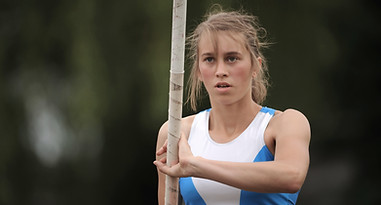
Athletes
Ath•lete: a person who is proficient in sports & other forms of physical exercise. (Oxford Languages)
Brynne works with various athletes across a variety of disciplines. These include the everyday athlete or "weekend warrior", high school, collegiate, amateur, Olympic, competitive, retired, and/or injured professionals.
The lifestyle & world of an athlete often possesses extraordinary circumstances which can cause unique mental health challenges. Because this population has historically been undefined within the mental health field, their unique issues have been overlooked.
Brynne's mission is to recognize athletes as a distinct population in need of specialization & to help athletes gain the insight & understanding essential to living a satisfying life. Below are some examples of the unique difficulties athletes face & the impacts they can have.
maintaining a narrow & strict definition of success
- You equate success, winning, & progress with happiness
- You don't accept anything less than 100%
- Less than 100% means you're a bad person/athlete/teammate
- You solely define yourself by your achievements
- You have unrealistic expectations of yourself
- You set extreme goals
- You engage in unhealthy behavior in order to achieve
your expectations & goals
- You sacrifice your health, free time, work, & relationships
- You cycle through times of high & low motivation
- Your mood, outlook, & self-esteem are significantly altered
by your performance


Identity
- You feel unsure of your identity outside of sport
- You don't know what you want out of life, where your interests lie, what
you are passionate about, & what else makes you you outside of sport
since much of your time & energy have been focused on one thing
- You feel sort of lost, aimless, & uncertain after retirement
- You may question how & why you ended up here
- You feel resentful towards those who may have pressured or
forced you into a life centralized around your sport
emotional detachment &
challenging interpersonal relationships
- You have a hard time accessing, understanding, & communicating your
feelings because your athlete training conditioned you to suppress them
- You struggle to relate & connect to those around you on a deeper level
- You have a hard time establishing healthy & long-term friendships &
romantic relationships
- You feel insecure about opening up about your feelings for fear of being
perceived as weak, losing a competitive edge, & risking your position


Self-esteem &
authentic confidence
- You struggle to feel confident in your abilities & yourself overall
- You have difficulties affirming & complimenting yourself - it feels
uncomfortable, inauthentic, or maybe narcissistic
- You often beat yourself up over minor mistakes for hours or even
days & weeks at a time
- You struggle to get past mistakes because they linger
in the back of your mind
- You have a tendency to hyperfocus on the negative
& discredit the positive
- You have a hard time believing the compliments people give you
- While, simultaneously, you may have become reliant on your
performance, teammates, coaches, & fans to feel happy or good
Depression & Anxiety
- You feel isolated & lonely, even when surrounded by others
- You don't truly feel happy but think you should & are unsure why
- You feel misunderstood by family, friends, or spouses
- You've developed a skewed body image, disordered eating habits,
or establish a poor relationship with food
- You're experiencing overwhelming emotionality due to the grief & loss
cause by an unexpected career/sport altering/ending injury, graduation,
or retirement
- You struggle to control your reactions to fear, pressure & stress
- It's challenging for you to balance work, life, school, & sports - you
consistently feel stress & pressure from all areas
- You feel like a disappointment or failure


adapting to
post-sport life
- You struggle or are unable to structure & manage your time since being
accustomed to a strict training regime
- You feel uncomfortable being alone & doing things on your own
- You have a hard time trusting yourself, your "gut", & your instincts
- You often look for validation or confirmation from others on your thoughts, feelings, & decisions
- You're often indecisive - overanalyzing all possible options & outcomes
- You feel like you constantly need to prove yourself, your worth,
& your dedication
- You have a hard time doing what you really want to do because
you're afraid of letting people down
chronic pain,
PTSD, OCD, & more
- You live with chronic pain due to injuries or overuse & now live
with frustrating emotional & physical impacts
- You experience symptoms related to PTSD due to sport-related physical
or emotional traumas such as injuries or abusive coaches
- You experience symptoms related to OCD since living a strict &
regimented lifestyle such as body issues, food issues, etc.


Sport-life balance
- Sport-Life Balance: Juggling practice, competitions, and rest days with
work, school, hobbies, and social life can be challenging.
- Occasionally experiencing resentment towards your sport and reflecting
on the journey that brought you here.
- Feeling misunderstood in the delicate balance of sports and life.
- Questioning the worthiness of the commitment, oscillating between
thoughts of quitting and persevering.
- Struggling with effective time management, occasionally forgetting
tasks, fearing things might slip through the cracks, and feeling remorse
for missing out on moments with friends and family.
Performance anxiety
-Performance Anxiety: A challenge that disrupts your ability to focus on
the present, driven by catastrophic hypothetical or real fears about the
past or future.
- Disconnect from your body as a result of being overly immersed in your
thoughts.
- Recognizing that optimal performance occurs in a relaxed state, feeling
stressed and tense exacerbates anxiety, significantly impacting focus and
overall performance.
- Dwelling on past competitions or performances that didn't meet your
standards.
- The fear of letting down coaches, teammates, family, and friends.
- Placing the entire success of your career on the outcome of a single
performance or competition.


fear of failure
- Fear of Failure: A challenge where the avoidance of pushing one's limits
in practice or competition stems from a fear of potential failure.
- You steer clear of specific competitions altogether due to this fear.
- Trying new skills, techniques, plays, or strategies becomes a daunting
task, driven by concerns about failure, injury, jeopardizing performance,
or the uneasiness of attempting something new.
- Superstitions and rituals, once coping mechanisms, might be evolving
into intrusive habits that are increasingly difficult to manage.
do-er syndrome
- Do-er Syndrome: An ongoing challenge where the inability to fully rest
& relax hinders overall well-being.
- Taking rest days often feels unproductive & wasteful, creating
a mental struggle.
- Despite being aware of the numerous benefits of rest, convincing
oneself & scheduling off days remains a significant hurdle.
- There's a persistent feeling that true relaxation is only achievable
after completing a workout or checking off every task on the to-do list.


coaches & coaching styles
- Navigating the process of adapting to new coaches and their unique
coaching styles, which can initially pose a challenge to familiar routines.
- Coping with the perception or reality of being unfairly targeted among
teammates.
- Handling emotions related to feeling unsupported or unappreciated.
- Managing the emotional impact of adapting to different coaching styles.
- Processing and coping with abusive coaching experiences.
- Processing and managing emotional reactions to feedback.
- Dealing with the perception of coaches emphasizing poor performances
over positive ones.
- Overcoming the fear of speaking up for oneself and finding a voice.
parent-athlete experience
- Striving to establish mutual understanding
- Encountering breakdowns in communication
- Balancing between support and parenting roles
- Dealing with feelings of frustration and worry
- Finding the most effective way to offer support while being mindful not
to exert undue pressure
- Managing the emotional challenges faced by athletes
- Facing difficulty in communicating effectively without resorting to
arguments









